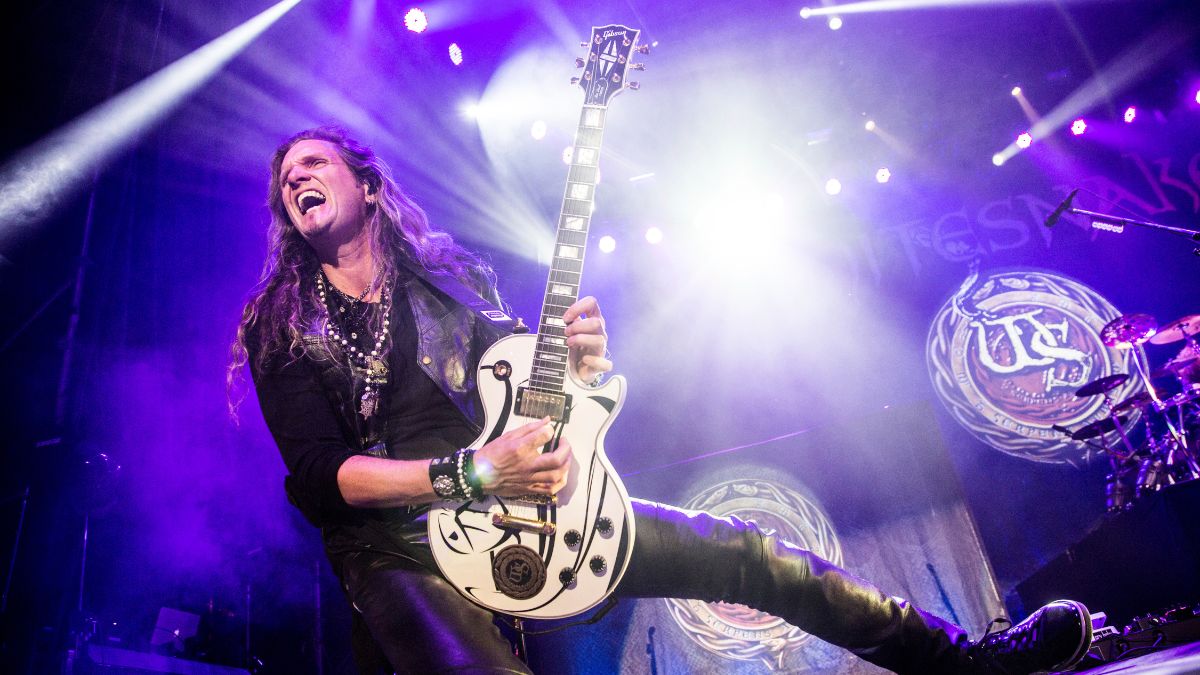“I thought maybe we’d have 2,000 people show up early, but our first performance was for 10,000 people. I was shocked”: Jake Kiszka on Mirador, his hard-riffing collab with blues brother Chris Turpin – and what it means for Greta Van Fleet

All the latest guitar news, interviews, lessons, reviews, deals and more, direct to your inbox!
You are now subscribed
Your newsletter sign-up was successful
This business of naming a band can be a tricky thing – and a little silly sometimes. Greta Van Fleet guitarist Jake Kiszka and Ida Mae guitarist Chris Turpin racked their brains trying to come up with the perfect moniker for the new group they had just formed.
Ideas were batted back and forth… but nothing clicked. Finally, in a dramatic bolt of inspiration, Kiszka seized on a word: Marauder. He excitedly texted Turpin, who enthusiastically agreed that the name felt right. But there was just one problem: Kiszka had misspelled the word as “Mirador.”
“I was like, ‘mirador’? No, no, I wrote ‘marauder,’” Kiszka says with a laugh. “Then we looked it up, and it said that a mirador is basically a vista or a viewpoint suspended on a high place, typically overlooking a body of water. That seemed to fit, and it felt symbolic being that Chris is British and he was always looking to the West for influences, whereas I looked East and got my influences from Europe. So that’s how we became Mirador.”
Kiszka and Turpin met back in 2018 when Ida Mae opened for Greta Van Fleet during a run of dates at the Fox Theatre in Detroit, about an hour and a half south of Greta Van Fleet’s old Frankenmuth, Michigan, stomping ground.
“I was very attracted to how they had this blues element that they mixed with worldly music and this sort of ancient folk approach,” Kiszka says.
“I remember watching their soundcheck before I had met them. They were these interesting, drab-looking British folks with blond hair. Chris had long hair and a goatee, and he played resonator guitar and slide. I thought it was really cool, and I connected with what he was doing.”
As it turned out, the admiration was mutual. The two guitarists became fast friends, and their relationship blossomed a year later when Ida Mae served as Greta’s opening act for arena shows in the States. Wine-fueled backstage jams became the norm, and before long Kiszka and Turpin were writing songs together and sharing vocals.
All the latest guitar news, interviews, lessons, reviews, deals and more, direct to your inbox!
“It was really great,” Kiszka says, “and fortunately the guys in Greta were totally cool about it. Because we’re a band of brothers [the group also includes singer Josh Kiszka and bassist Sam Kiszka, along with drummer Danny Wagner], there was always that kind of thing when we were kids, where I’d go off with a new friend from school. But in the end, the brothers would always get back together.”
Once Kiszka and Turpin decided to formalize their partnership and take things a step further by forming an actual band, they rounded out the lineup by bringing in London hotshots Mikey Sorbello (drums) and Nick Pini (bass, keyboards).
Greta Van Fleet’s 2023 Starcatcher world tour was already on the books; the year-old excursion might cause Mirador to lose some steam, but Kiszka had an ace up his sleeve: his new band would simply open shows for Greta throughout the U.S. run. All of which meant there was a hell of a lot of Jake Kiszka on stage each night.

“I don’t think there was any pacing myself during those shows,” he says. “It was absolute trial by fire, and by the end there was sort of this controlled chaos to it. It was a little crazy, doing this 40- or 45-minute set with Mirador. Then I’d get off the stage, go get ready and go back out to do a two-hour headlining set with Greta Van Fleet.”
At the conclusion of the U.S. tour, Kiszka felt as if he’d pushed himself to the limit. “It was overwhelming,” he says. “I was experiencing emotional nuances to this dance that I had to try to overcome. I think what made it all possible for me was the band chemistry between everybody in Mirador, and that chemistry was immediate.
“If I didn’t have the support from those guys, it would’ve been very challenging for me to get through it. There was a brotherhood in Mirador that was forged in the fire of those shows.” He pauses, then adds, “And, of course, it’s there with my brothers in Greta. I think all of my bandmates helped keep me alive.”
A good many side bands sound like exactly that; their records are tossed-off affairs not to be taken seriously, and to varying degrees, they’re simply excuses for musicians to let off steam from their day gigs. But on Mirador’s self-titled album, the group comes off like the real deal, and they serve up a full-bodied set bursting with nerviness and brio, along with a host of exquisitely crafted songs that arrive fresh and vital.
It’s always a pleasure to listen to marvelously gifted people doing what they do well, and here we have Kiszka and Turpin going toe-to-toe and blowing each other’s minds. Turpin’s voice is that of a bourbon-flavored chest-beater, while Kiszka’s forceful tenor reveals piquant nuances. Together they’re dynamite.
As guitarists, they come loaded for bear. Riffs pile atop riffs, and tangled, snarling solos land punch after punch. On gutsy, cosmic blues rockers like Roving Blade and Raider, the two rip it up with wah-drenched leads and smarty-pants licks.
Things get chill and pastoral on Dream Seller and Ten Thousand More to Ride, but Ashes to Earth (a last-minute addition to the album) takes off in a heady gallop and just won’t quit, with Kiszka’s spitfire soloing accelerating the pace.
Kiszka sounds like he’s having the time of his life with Mirador, and he’s psyched to hit the road with the new gang. But he stresses that, no matter how well Mirador is received, it won’t spell the end of Greta.
For the most part, though, it’s the four of us looking out at this sort of cosmic space every night. There’s this sort of black void, and the people just go off into the distance
“We’re working on a record right now, as it were,” he says. “So I’ve sort of gone into this very involved landscape of working between two different groups.” Asked if the other members of Greta are entertaining their own side projects, he smiles and says, “Yes. You’ll see it’s all sort of up in the air… but you’ll see.”
When Greta Van Fleet were starting out, you fine-tuned your songs in clubs. For a long while, you were under the radar while you got your act together. Was it a little strange to road test Mirador’s songs in front of 20,000 people a night?
“I think so. I honestly didn’t really know quite what to expect. I didn’t know how many people were going to show up. We went out with this new material, but in a way there was nothing foundational for them to react to. But by show two, people were already singing the lyrics to this unreleased music.”
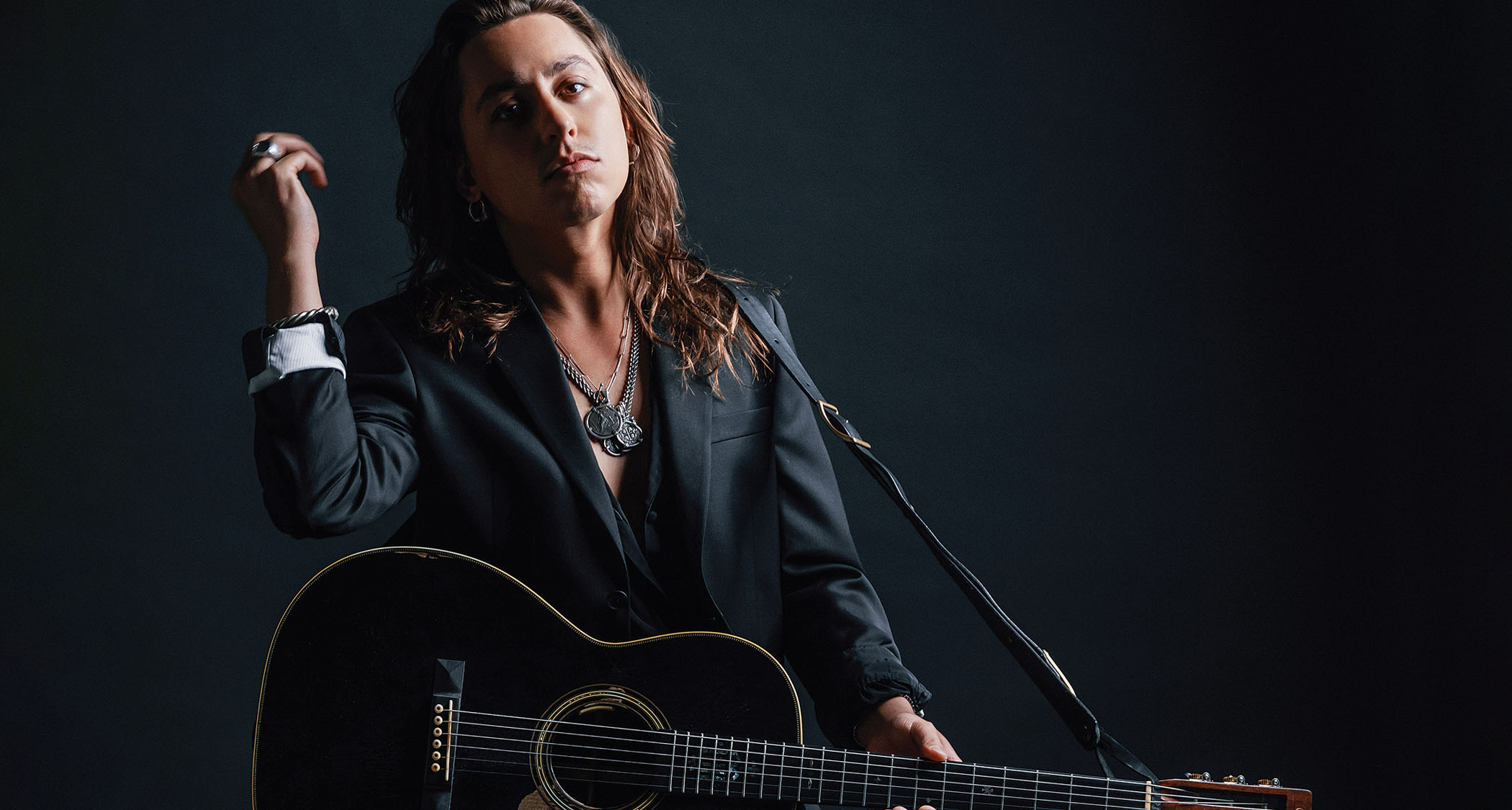
Because the night before the audience recorded you on their phones, and the videos went around.
“Yeah. I thought maybe we’d have about 2,000 people show up early, maybe a bit, but almost every single night of that tour, the arena was packed full. Our first performance was for something like 10,000 people. It was really remarkable, the response to it. I was shocked.”
Greta is now a big-time arena band. Has success changed the way you guys operate, business-wise or creatively?
Another aspect of Mirador that I was anticipating was that we’d have this intimacy with people again, and we could connect with them more directly through the music
“I would say in some aspects, in that the business landscape surrounding the musical industry has evolved. There’s a lot more people involved with us now than there once were. It’s getting to that point where you don't necessarily know everybody by name, whereas before we were going into a club or a theater and we saw people’s faces and connected with them in a more intimate setting. I suppose now you can do that to a certain degree with the people down in the pit.
“For the most part, though, it’s the four of us looking out at this sort of cosmic space every night. There’s this sort of black void, and the people just go off into the distance. I guess some of the nuance of that connection or that intimacy gets lost because of the sheer scale of these venues. It’s arenas every single night.
“I think another aspect of Mirador that I was anticipating was that we’d have this intimacy with people again, and we could connect with them more directly through the music.”

In the early days of Greta, you guys were so young, and there was no real roadmap at first; you were all just making it up as you went along. I imagine it’s different with Mirador because you’re something of a veteran musician. You know what works and what doesn’t.
“That was another interesting aspect to Mirador. There were a lot of things I wish I had done with Greta that if I could go back in time and do differently, I would.”
Such as?
“Such as the way things were recorded. I love the way that there’s an evolution to what Greta has done, and there’s a stark difference between every record we've created, which I think is quite cool and unique.
“With Mirador, I think it’s going to be different because there are musicians who weren't playing in a garage growing up together. They’re sort of seasoned veterans of their own kind, established musicians and artists, if you will, from different parts of the world.
“Mikey and Nick are very serious session players and have played throughout the underground London circuit scene. I know Nick has done a lot with Adele. But even so, they’re kind of under the radar. And, of course, there’s Chris and his approach to guitar playing.
“Getting all of these people together, it wasn’t going to be like, ‘Let’s figure out who we are and what we stand for.’ It was more like, ‘We’re a bunch of men who know.’ We got together and it was just like bash! The thing just happened in a spontaneous moment, and Mirador became what it was.”
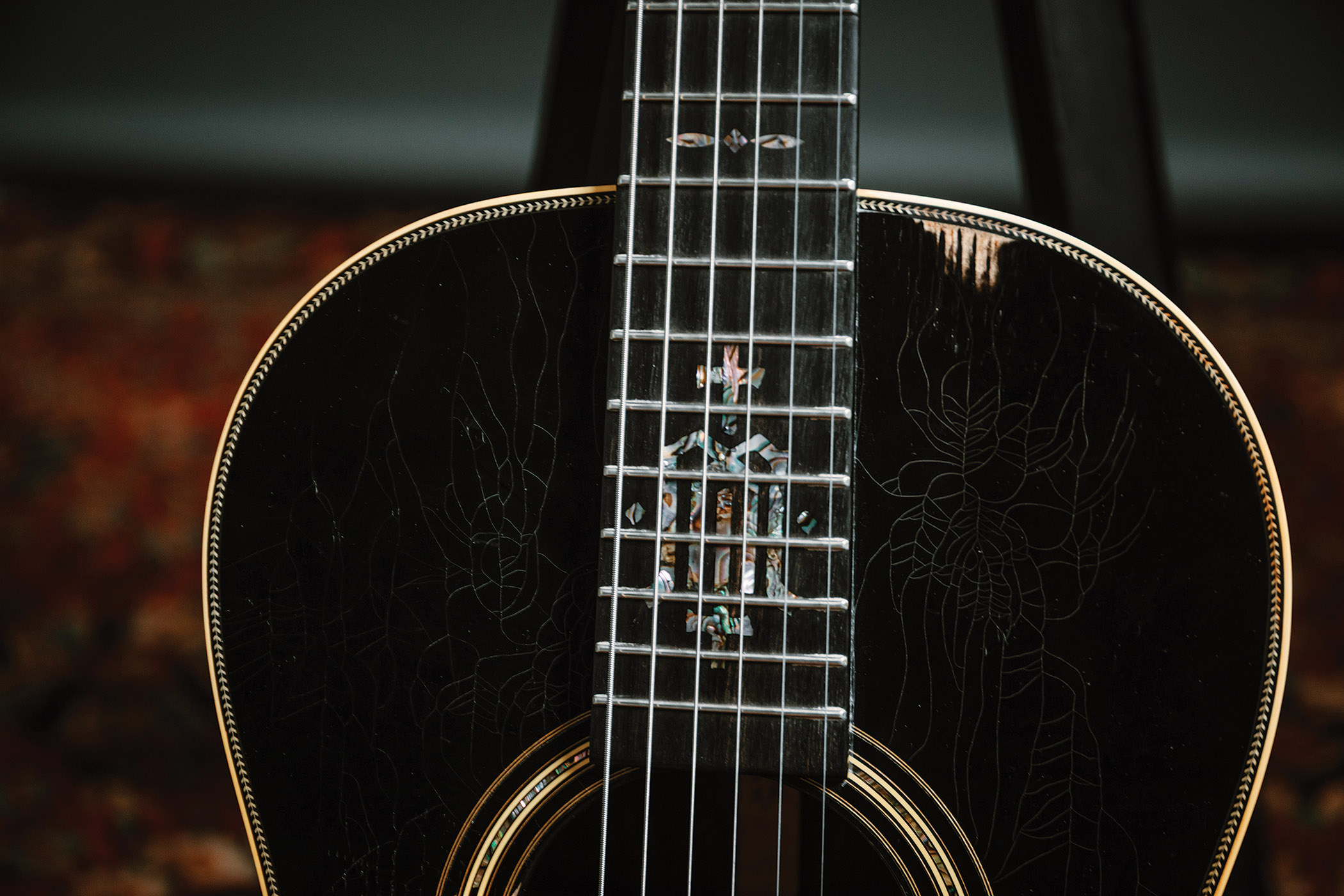
Launching any new band is tough, but you have a leg up because of Greta’s fanbase. The simple fact is, there’s a segment of people who are going to be interested in what you’re doing.
“Yeah.”
At the same time, some Greta loyalists might be disgruntled. Fans can be a little territorial.
“Of course. Not that I’ve noticed that particularly, but I’m sure there’s a faction of people who understandably do share that philosophy – ‘I want to see this thing I’m familiar with. I know it speaks to me, it touches me.’ I think you’re right. I think you nailed it with that. There is probably a fraction of people who have a protectionism over the Greta thing in some ways.”
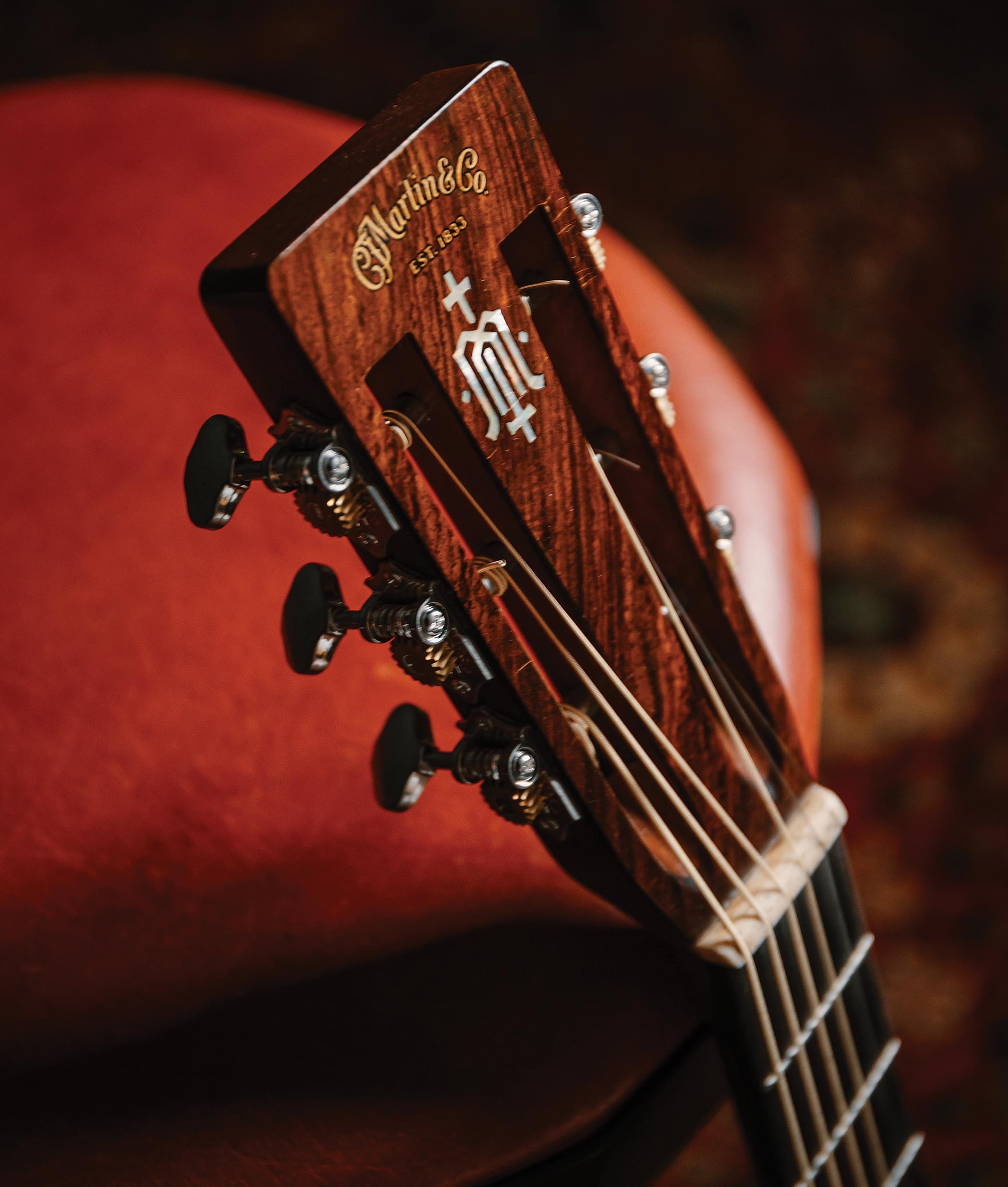
What kind of musical common ground do you and Chris share?
“This has been pretty interesting to me, I think, because our initial relationship grew from our identical influences. At the same time, there are commonalities between Greta and Mirador – we both share blues as a foundation. With Chris and me, maybe being more guitar and vocal-oriented individuals, we were drawn to it. As kids, we were raised on it.
The two of us grew up playing guitar, and we learned blues music by the original guitar heroes
“Chris’ fascination varies from mine as he’s from England, and he was getting all the imported stuff from all the old record labels, the Chicago and Delta blues. I kind of grew up in Detroit where there was a lot of that Motown, but I also had this immediate influence from all the blues records I had.
“The two of us grew up playing guitar, and we learned blues music by the original guitar heroes. That was a huge connection between us. We talked about Junior Kimbrough, Muddy Waters, Howlin' Wolf and Lightnin’ Hopkins… Elmore James and Albert King, Freddie King and all the Kings… Buddy Guy. All this blues stuff was mecca for us.
“Chris gets really into the blues, and he’s sort of a historian. I found that fascinating. We traded lots of guitar licks. I mean, I was finding a lost brother who had all the guitar licks that I didn’t. So there was a huge pivot of diffusing into each other’s playing in some way.”
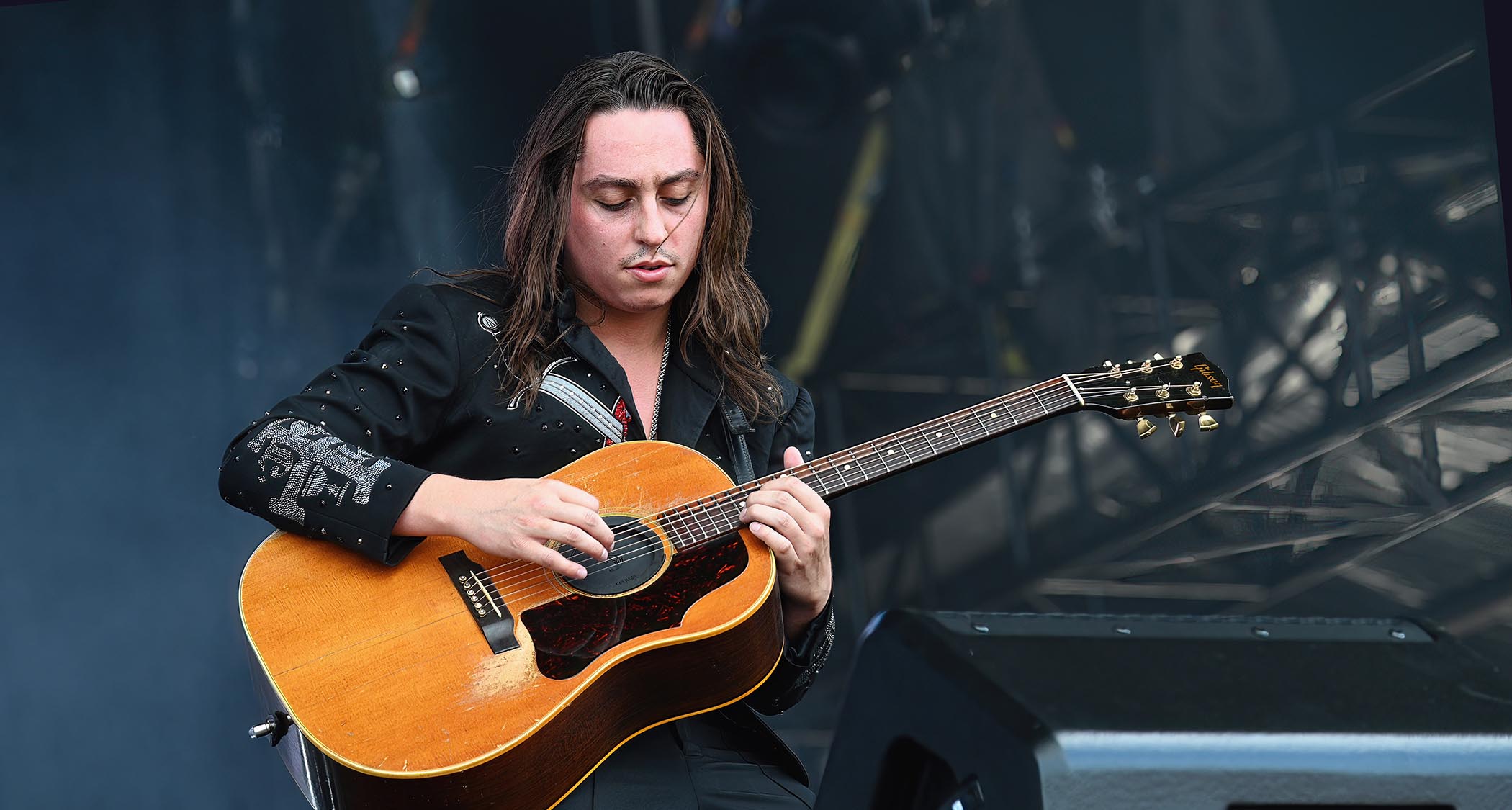
This must have been new for you, because in Greta you’re the one making all the guitar noise. But now you have somebody to work off of; you didn’t have to create that sound yourself. Was there a bit more freedom there?
“Yeah, I would say so. I mean, that’s an interesting question because you can sort of hear the guitar playing and be like, ‘Oh, that does sound like something Jake would do.’ But there’s also these elements of, ‘Oh, that’s something Chris would do.’ It seemingly comes together as a uniform thing.
“But as much as I was able to remove myself from just solely focusing on the guitar playing, I was now starting to focus on the vocal aspect of the record. There would be times when I’d go, ‘This guitar part is kind of done and I'm happy with that. I’m going to leave this be and Chris can smooth it over.’
“That was a completely different approach for me, and one that I was very unfamiliar with, approaching vocals and guitars. In some ways I found the solution on the record was to do less with the guitar. I would be like, ‘What do I do here?’ Actually, in most cases, the answer was to do nothing.”
I imagine you already encountered that on stage, where you were trying to focus on singing.
“Totally.”
You were like, “I can't do this complicated lick here while I'm trying to put a song across.”
“Yeah, totally – which is frustrating. But yes.”
Is there a difference between how you write with Chris versus how you write songs with the guys in Greta?
“I think so, because typically with Greta, there’s four guys and they’re all main contributors. Something comes in on different instruments all the time, and sometimes it’s just vocal. Sometimes it’s on piano, sometimes it’s guitar. Sometimes it’s just a song idea based on an orchestral piece of music or some world music. There’s so many different angles.
“With Mirador, it’s fascinating because it’s just me and Chris as two partners locking in together. It’s a fusion of how much can we do with two vocals that haven’t been done before, and specifically in the realm of rock ’n’ roll as this genre specifically.
“But as it applies to everything else, it’s like, ‘How can we approach two vocals in a way that hasn’t been done, and how can we approach two guitars at the same time in a way that hasn’t been done?’ We thought it was interesting territory to be in.”
“Part of the writing chemistry became, ‘Where do we put these harmonies? How are they going to be?’ And then creating actual guitar riffs where two guitars come together to effectively achieve one thing that could be played on a single guitar by one person if that’s what we wanted.”
You’re working again with Dave Cobb, who produced Greta Van Fleet’s 2023 album, Starcatcher. Did you at first think, “New band, so we need a new producer”?
“There were a few names in the hat, [producer/engineer] Ethan Johns being one of them because Chris is quite close with him. There were a few other ideas. I’ve done a lot of production work with Greta that’s coming up, and Chris has done a lot of production work as well, so we were thinking that maybe we could self-produce the record.
“But pretty soon the material became a main influence in deciding how we were going to go about producing it, and Dave was immediate to me. He was the right choice for the record we were trying to make, with us co-producing.
“I had a really specific idea of what I wanted it to sound like, and Chris allowed me to take the reins. He wanted me to get across what I was hearing and feeling. So I called Dave and asked him if he’d be interested in co-producing this new project, and he was into it.”
Let me ask you about a few songs. Roving Blade has an absolute whopper of an end solo. What was going on there?
“From a guitar perspective, I think I was using my beloved ‘number one’ – the ’61 Les Paul. That solo was interesting in that I had a basic pedalboard while we were tracking; I had a ’60s Hendrix Vox wah, and I was going through an old Princeton amp. But I played the solo as something of a placeholder. I was improvising and working my way through it with the idea that I would perfect it later. Then we got to overdub world and Dave said, ‘That solo, just leave it. It’s perfect.’”
That happens time and time again.
“It does. It was like I was ‘one-take Jake,’ as they call me. It was a good solo, but I was a little skeptical. I thought I could beat it, but Dave and Chris were very adamant that it remained that way, which is fine. I’ll admit, there is this kind of imperfection in the solo, but I think it’s full of attitude and it just leaps.”
That’s what counts.
“Right. I think there might have also been a stereo slap pedal on that as well, but we definitely pushed the volume.”
Blood and Custard has an epic riff. Those kinds of riffs don’t come along every day, do they?
“No, they don’t. I think that song is a perfect example of what type of things don't necessarily translate in the world of Greta. That was a riff I had for a long, long time. It’s just been sitting on the shelf.
“I would say I was influenced by the Eric Clapton and Duane Allman song Mean Old World, that kind of acoustic interpretation of a traditional blues song. So I had this thing hanging on the wall, and I wanted something with slide guitar on the record.
“Obviously, Chris is a great and very unique slide player, and I’m also known to play some slide, which I love doing. I put that riff to Chris and he loved it. He suggested Blood and Custard, which was an old nickname for the original Vox [AC] amplifiers – they had this cream-and-red binding. That’s a good [example of] guitar nerdism.”
Greta didn’t want that riff?
“No.”
What’s wrong with those guys?
“[Laughs] Yeah, exactly! That’s what I’m saying. I think Josh is very critical of guitar things, and it wasn’t something that he was particularly interested in. I don’t think it ever made it to the final stages.”
Wow. All right then. Ashes to Earth is one of the most exciting tracks on the record. It grabs you right away and gets the job done.
“Oh, thank you. That song originally started out completely different. If you can imagine it, it was a ballad at first. Dave listened to it and said, ‘We need something that’s more aggressive. I think we can enhance the danger level on this one.’ He went home and then Chris and I put together what you hear now.
“Dave came back the next day and loved it. Again, I think this is one of those things where that delineation between Greta and Mirador becomes more present. It’s a pretty heavy song. I think it’s slightly more aggressive than anything Greta has done.”
Are there guitar or sonic elements you employed in Mirador again that you just haven’t been able to get across in Greta?
“I think I’ve been quite clever in how I incorporate most of the guitar-type stuff that I want into Greta. Again, the only person who really meets me with disinterest or pushback is Josh, really. That’s understandable, because the vocals and the guitars are very succinct in their frequencies, but they’re also melody instruments.
“Josh is singing lots of melodies, and I’m a very melodic guitar player, so those two things do have a tendency to clash. I’ve wanted to play more 12-string guitar, and I was able to do a lot of that on the Mirador record. The slide playing was also a huge aspect, because again, slide and some of the vocal things weren’t working together in Greta, but here they did.
“I should point out that the sheer volume of the guitars on this record is another difference. Dave Cobb was like, ‘Look, this is a guitar record by two guitar players. People are expecting to hear guitar, so we're going to turn them way up.’ [Laughs] I couldn’t agree more.”
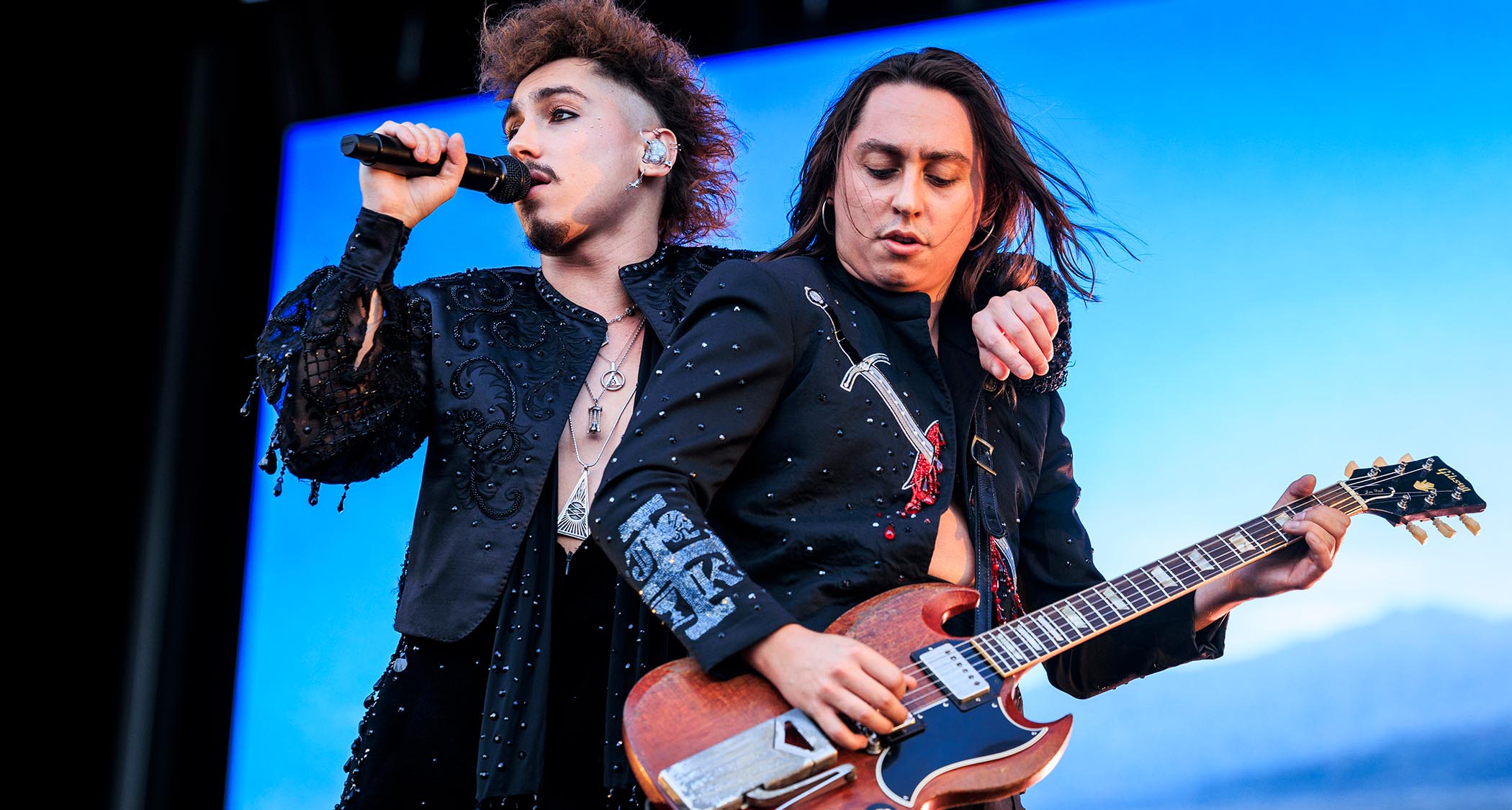
Did you have a go-to set of guitars for the record?
“Yeah, it ended up being that way. I think the guitars I play on records seem to be the ones that are close by and accessible. Obviously, I use my ’61 Les Paul a lot – I’ve always been steadfast about that one. There were two acoustics that I used – one was Dave’s old pre‑war Martin, the 00-18.
Dave has this early ’50s Telecaster. It was his first guitar, and he just loves it... It was one the best-sounding Telecasters I’ve ever played
“That was a huge one. I was pretty glued to that guitar, and I write almost exclusively on it. There was a Gibson 12-string electric – it was an ES-335 with this brown sparkle. It’s pretty unique. That guitar was a gift from Daniel, the drummer in Greta. I used that one on the record; it’s on Fortune’s Fate.
“Dave has this early ’50s Telecaster. It was his first guitar, and he just loves it – it’s the guitar. I have to agree with him. It was one the best-sounding Telecasters I’ve ever played. I used it on a track called Heels of the Hunt. Dave was like, ‘We’re done with the record, but let’s do one last track. You and Chris go out on the dock, write a song, come back and we’ll record it in 24 hours.’”
Sure. No pressure.
“[Laughs] No pressure, yeah. We were in Savannah, Georgia, out on the water. So Chris and I were like, ‘OK, this is a test.' I think the objective was to get the ideal dream guitar tone, and for me it was an old Selmer combo amplifier and Dave’s Telecaster. It was just the most incredible guitar tone I've been able to get.”
What other guitar amps did you use?
“I used a few combo amps and a lot of Fenders. There was that Princeton amp I mentioned, along with some Fender Pro Reverbs and a few new Fender Champ combos.”
Okay, so realistically, how much extracurricular time are you going to be able to devote to Mirador before you have to go back to Greta World?
“It’s going to be interesting. There will be a balancing walk between giving as much as I can to one thing before I can go back into the other thing. I’m in a position where I’m sort of walking away from Greta and into Mirador, and I’ve basically been given a year to do as much as I can before I go back and transition to the other world, with potentially a new Greta record at some point soon. I think my world will be like that for a while.”
I’m just thinking about what you told me about the Blood and Custard riff. Let's say you came up with another awesome riff tonight. Will you be thinking, “Shit, which band do I give it to?”
“[Laughs] That’s it! That's the dance, that's the balancing act. Even now, there's things I’ve put together that come about, and I try to discern whether it belongs to Greta or Mirador.
I think if it comes down to it, I have to go to the Greta guys and say, 'You have rights to this first'
“Normally, I can pre-dictate that. There have been times when I’ve brought a riff to Greta, and the guys go, ‘That’s not a Greta song, man. That’s a Mirador song.’
“Obviously, there’s enough for interpretation, and I’ve explained to the guys – ‘Look, we can manipulate this, we can arrange it, and we can nuance it so that it fits Greta.’ And they’re like, ‘No, it belongs to Mirador.’ Some songs are like that.
“I think I have a pretty good gauge on which is which, because the two groups are sort of separate enough and they both have their own sound. But I think if it comes down to it, I have to go to the Greta guys and say, ‘You have rights to this first.’”
But then you don’t want to go to Chris and have him say, “Oh, is this the stuff that Greta turned down?”
“Yeah, exactly! [Laughs] Right. And it kind of goes both ways. With Blood and Custard, It was like, ‘Wait… that was one of ours!’”
I see your problem. Sounds like you need to start a third band.
“Exactly. Don’t give me any ideas!”
- Mirador is available to preorder now and will be released via Universal on September 19.
- This article first appeared in Guitar World. Subscribe and save.
Joe is a freelance journalist who has, over the past few decades, interviewed hundreds of guitarists for Guitar World, Guitar Player, MusicRadar and Classic Rock. He is also a former editor of Guitar World, contributing writer for Guitar Aficionado and VP of A&R for Island Records. He’s an enthusiastic guitarist, but he’s nowhere near the likes of the people he interviews. Surprisingly, his skills are more suited to the drums. If you need a drummer for your Beatles tribute band, look him up.
You must confirm your public display name before commenting
Please logout and then login again, you will then be prompted to enter your display name.












